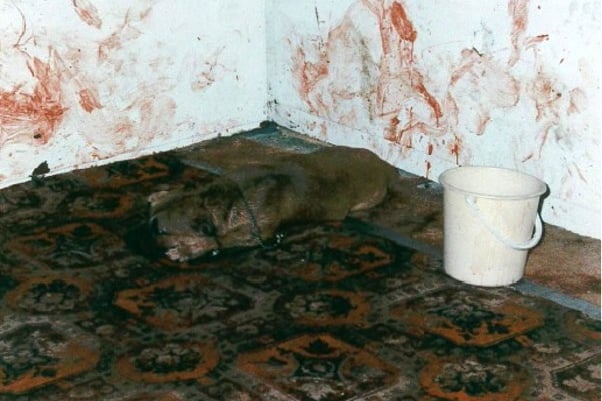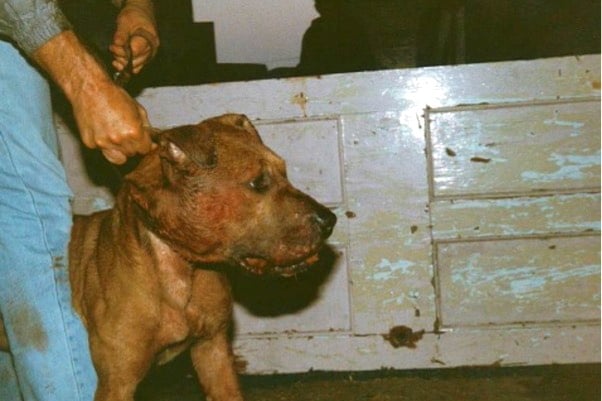Dog fighting. The very mention of the phrase conjures up images of Victorian squalor, Sadly though, it’s very much a reality here in Wales in 2023.
Inspectors from the Royal Society for the Prevention of Cruelty to Animals report that they found 55 cases of the illegal and barbaric practice in Wales during 2022.
In Powys, three cases were reported, in Ceredigion, there were two.
And those who are behind the crime are getting more cunning in evading detection.
RSPCA dog fighting expert and Special Operations Unit chief inspector for Wales, Ian Muttitt, said: “Sadly we are back seeing pre-pandemic levels of dog fighting incidents.
“
It’s staggering that something which has been illegal for nearly 200 years, which most people would consider consigned to history, is still so rife.
RSPCA chief inspector Ian Muttitt
“Across England and Wales we were seeing an average of 19 incidents investigated every month in 2019 and that has risen to a shocking 31 a month so far this year. While last year in Wales there was a notable increase in dog fighting incidents.
“It’s staggering that something which has been illegal for almost 200 years which most people would consider consigned to history is still so rife.”
The RSPCA recently launched its Cancel Out Cruelty campaign, to raise funds to help its frontline rescue teams continue to save animals from cruelty and abuse and to raise awareness about how to stop cruelty to animals for good.
“Each year, these reports of cruelty reach its terrible annual peak in the summer months.” Ian continued. “Around this time of year nationally we receive a report of an animal being beaten on average every hour of every day.
“We don’t know why reports of animal cruelty peak in the summer months although things like animal abuse being more visible as people are outdoors more and the cost of living crisis could be major factors,” Mr Muttitt said.
And dog fighters will go to any length to try an breed “the ultimate dog” for their beastly racket.

One recent case heard that police and RSPCA investigators found eight dogs during a raid on a premises in Sleaford, Lincolnshire — some of the animals were supplied by a man from Angelsey — including an American bulldog, a Bully Kutta cross Presa Canario and a pitbull terrier. Some of the dogs had horrific injuries, were scarred from fighting and in poor physical health.
The searches uncovered paraphernalia commonly used by people involved in dog fighting, including a ‘flirt pole’, a long pole with a rope attached and a ‘break stick’, a tool commonly used to break up a dog fight.
Common charges are keeping and training dogs for fighting, ear cropping and causing unnecessary suffering, or failing to provide veterinary care for injured dogs.
Distressing footage in one instance showed dogs being forced to fight for up to 45 minutes and being trained on treadmills. One video showed a dog tied to a treadmill and forced to run – a common training technique used to build up strength for fighting dogs.
Text messages exchanged between ring members indicated that one fight lasted 45 minutes and had ended when a terrified Presa Canario jumped out of a window to escape a pitbull terrier as the latter dog went in for the kill.
Another text made reference to one dog being able to crush another’s bones with one bite.
“
Signs of dog fighting can vary but if you notice a dog with lots of scars on its face, front legs, hind legs and thighs, or with puncture wounds and mangled ears – this could be a sign.
RSPCA chief inspector Ian Muttitt
Mr Muttitt said: “Dog fighting, which is connected to organised crime, is just one of the many acts of cruelty we see every year. The RSPCA is the only charity rescuing animals and investigating cruelty in England and Wales with a team of frontline rescue officers, specialist vet teams and a network of animal care centres and branches working tirelessly to save animals and provide rehabilitation to animal victims.
“Together, we believe we can and will cancel out cruelty to animals by replacing violence with kindness. We are urging people to donate to our Cancel Out Cruelty campaign, every donation will help animals.”
Dog fighting was outlawed in England and Wales in 1835 but still goes on today. The RSPCA - founded nearly 200 years ago - is the country’s leading organisation tackling dog fighting and, for the last four decades, the RSPCA’s Special Operations Unit have been investigating reports, rescuing dogs and bringing those responsible to justice.
Sadly, many of the dogs used by dog fighters are never found and those who are rescued are often identified as banned breeds under the Dangerous Dogs Act* and cannot legally be rehomed.
In total the RSPCA’s SOU have investigated 1,156 incidents of dog fighting across England and Wales since 2019. London has been revealed as the worst hotspot for dog fighting with 91 incidents, Greater Manchester (82 investigations), West Yorkshire (69 investigations) and the West Midlands (59 incidents), and Lancashire (56) following closely behind.
Wales as a whole would appear next in this list with 55 incidents.
Mr Muttitt added: “The dog fighting world is a dark and secretive place. It could be happening in an inner-city warehouse next door to your office or on a rural farm in your quiet village.
“Signs of dog fighting can vary but if you notice a dog with lots of scars on its face, front legs, hind legs and thighs, or with puncture wounds and mangled ears - this could be a sign of dog fighting and should be reported to the RSPCA or the police. Other suspicious activity includes dogs being hidden away in outbuildings or kennels of sight and not exercised in public.
“Dogs who win fights are prized but those who refuse to fight or lose are often abandoned or killed.
“Overall dog fighting in England and Wales has increased since 2019, jumping from a total number of 232 incidents investigated by the RSPCA in 2019 to 355 in 2022. We have dealt with 155 incidents this year, but we are only six months into the year, so we are concerned we will see this number steadily rise.”
‘Heartbreaking’ cruelty on the rise in Wales
Heartbreaking figures released by RSPCA Cymru have shown reports of intentional harm has risen by nine per cent - with incidents peaking during the summer months.
As a result, the animal charity is bracing for one of its busiest summers this year as it expects another summer of suffering, with more people reporting cruelty to animals from July to September.
The figures, exclusively released today by the RSPCA, shows calls relating to international harm in Wales over the past three years have increased from 691 (2021) to 753 last year (2022).
The total number of complaints of alleged cruelty (all animals) in 2022 across Wales was 5,632.
In July, August and September calls about international harm were at its highest with 73 in July, 83 in August and 82 in September.
The three highest counties for intentional harm calls were Swansea (62), Cardiff (61) and Rhondda Cynon Taf (59). The most calls in north Wales was in Flintshire with 54.
Dermot Murphy, RSPCA inspectorate commissioner, said: “Right now, animal cruelty is happening in England and Wales on a massive scale and rising. It is heartbreaking that we are seeing such sad figures which show animal cruelty is, very sadly, on the rise.
“While we don’t know for certain why there has been an increase in reports of cruelty, the cost of living crisis and the post-pandemic world we live in has created an animal welfare crisis with more people getting pets with potentially less time and money to care for them.
“Each year, these reports of cruelty reach its terrible annual peak in the summer months – when we receive a report of an animal being beaten on average every hour of every day.
“The cost-of-living crisis also means the cost of rescuing animals is at an all-time high and our vital services are stretched to the limit.”
It is not known why reports of animal cruelty peak in the summer months although factors like animal abuse being more visible as people are outdoors more, could be one factor.
The RSPCA are urging the public to be their eyes and ears and to report anything suspicious to them. Anyone who is concerned about the welfare of an animal or suspects dog fighting may be taking place should visit our website to find out how to report cruelty
The RSPCA are highlighting the issue as part of the charity’s Cancel Out Cruelty campaign.
Sadly the RSPCA receives around 91,500 calls to its cruelty line every month and investigates 5,300 reports of deliberate animal cruelty but in the summer calls rise to 133,000 a month - which is three every minute.
In the past, the RSPCA has seen cases where dogs are found to be injured badly and items such as treadmills and scales are found which are often used by dog fighters to train their dogs and prepare for a fight .
Mr Muttitt said: “Dog fighting is a cruel and barbaric practice that has no place in modern day society. We will continue to investigate any reports of dog fighting taking place and would urge anyone who suspects it is happening on their doorstep to contact our 24-hour cruelty line on 0300 1234 999.
Have your say on the issues that matter to you. Get in touch today: email [email protected] or call 01970 615000




